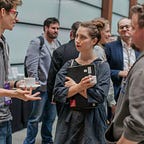Five takeaways from Outriders Network Season One
Season one of Outriders Network activities has come to an end.
We have travelled to over 13 locations delivering more than 20 workshops and producing 27 talks. We have launched a database of interactive stories comprising of over 900 records. We have published 12 articles, reached over 4000 people, build a group of 1500+ journalists and sent seven issues of our new, newsletter called Outriders Network: PULSE which is read by over 2000 people every two weeks.
What did we learn? Read these five points below to find out.
Innovation Happens in The East
There is plenty of innovation happening in Eastern Europe — or even further east & south, in Asia and Africa. We’d like to debunk the popular belief according to which we should all learn from the West. Let’s learn from one another instead. After all, we all share similar problems (funding, political climate, information consumption) and should focus on covering complex, global topics such as climate catastrophe & migrations. Journalism spans beyond borders and regions (and so should its funding).
Under the umbrella of our Outriders Studio’s Media Garage program, we are currently working with new media startups from Belarus, Moldova and Ukraine on tuning up their organisational capacity. Our meetups and workshops took place in Warsaw, Bucharest, Athens, Sarajevo, Taipei, Zagreb, Yerevan, Lviv, Chiang Mai, Minsk, Sofia, and Budapest. Our partners, as well as the Network’s community, includes many journos and storytellers from South & East Europe.
If you want to talk about innovation in this region — let’s! If you want to watch something about it first, this is our session from the XIV International Journalism Festival in Perugia — just give it a go.
Journalism Is (not) in Crisis
The paywall has not been a sustainable business strategy for media outlets for some time now. Big tech companies disrupted the way people consume news today. Our societies are polarised and in response, turn to populist and despotic leaders who manipulate the facts and simplify stories tearing them off the necessary context. We lack common narratives and global solutions. Journalists all over the world are threatened, silenced and shamed. It all is true.
On the other hand, we live and work in the times of pulsating, historical importance. The communications models are shifting, and people crave reliable information. As Nick Newman from the Reuters Institute for the Study of Journalism notes “The established big media outlets are seen as doing a better job at breaking news than explaining it.” People crave change. Journalism is in the very centre of these events. And so are we — isn’t that every reporter’s dream?
Journalists Aren’t Good at Sharing
Historically journalists haven’t been good at sharing. I used to be more about having THE story, the sources, about the competition. In the modern world, however, sharing began to be a skill which if you don’t train — you might not have. Our meetups, now branded “Showcase”, rely on journalists talks. We want storytellers to tell their stories; we want them to sum them up while sharing them on our group. But public speaking, presenting and promoting your work isn’t everyone’s strength.
We want to help journalists learn that and we are committed to spending more time with each presenter. We also kindly ask you to bear with us as we fix our technical problems with recording the sound and the image — we now have a professional events producer on board and we will make sure that showcases live up to audience’s expectations!
Peer Learning is Hard if You Don’t Work Together
When an entire ecosystem is changing top-down learning stops being effective. There are things that new media organisations can learn from prominent media outlets, but they are limited — the smaller organisations don’t have these kinds of audiences, resources, and often their focus is different than this of for-profit organisations.
Reading, listening and talking about the experiences of others help, but the best way you learn how to do things is in practice. It is also hard for new organisations to prove themselves without actually producing content. That is why the next season of Outriders Network will have a new objective — we will not just talk the talk, we will actually produce stories, together.
Every Community Needs to Meet Offline
Online accelerates communications, but nothing replaces the feeling people have when they eventually come together. It might not even be for work but inspiration and celebration.
Journalists, storytellers and Outriders Network community have things to celebrate — we are trying to push change, and we have been quite successful so far. That is why the theme of the upcoming Outriders Stage & Backstage is “Let’s come together”. The event is coming up on November 21st and 22nd in Warsaw, Poland. We are about to announce our first keynote speaker next week.
Apart from the Summit, we are currently planning our Labs (workshops) and Showcases (meetups featuring journalists’ talks) for the next season. If you’d like to speak at the Showcase, partner with us or invite our Labs to the event you are organising — send an e-mail to Alicja (at) weareoutriders.com.
We are looking forward to the next 12 months of trying new things out, failing, learning and working together. Here is to that!
